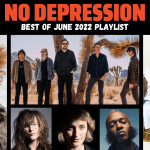A Record of His Own: Roland White’s Solo Reissued
Roland White was there at the beginning. When the White brothers, Dillards, Scottsville Squirrel Barkers and like-minded young pickers added bluegrass to the folk revival blossoming on college campuses and at clubs such as LA’s Ash Grove. And when he and brother Clarence planted the seeds of newgrass with the Kentucky Colonels, bringing a fresh California energy to Appalachian traditions. And he would like you to know that he’s still here, keeping the Grammy-winning Roland White Band rolling, teaching and leading workshops, and tending the enormous legacy he and his brothers created in country, bluegrass, and rock. There’s an exuberant addition to that recorded legacy with the Tompkins Square release of Roland’s 1976 solo record, I Wasn’t Born to Rock ‘n Roll, remastered and on CD for the first time. The thirteen tracks display Roland’s mastery of bluegrass playing and singing, include an unreleased song from the sessions, and an energetic instrumental Roland and Clarence wrote while on a 1964 Kentucky Colonels tour. From today’s perspective, the title is ironic and even poignant. I Wasn’t Born to Rock ‘n Roll captures a band whose members powered some of the brightest lights in LA’s late-60s country-rock scene, experiencing its commercial crescendo — and its most personally devastating year.
After bringing bluegrass out of the folk clubs and into the concert halls and festivals with the Kentucky Colonels, Clarence White found work and new energy in the electric mingling of country, bluegrass and rock that filled LA’s canyons and valleys. That unstable musical chemistry combusted with Byrds-Springfield-Poco-StonePoneys-DillardClark-StoneCanyonBand-NittyGritty-Submarine-Burrito Brothers in kaleidoscopic proliferation and combination. Roland missed all that, untempted by the rock scene. “I was here [Nashville],” he remembers. “I’d hear about it, but… .” When Clarence joined the Byrds, Roland left home to tour with his heroes, first serving with Bill Monroe and then Lester Flatt. The teenager who drilled his younger brothers with Monroe, Flatt and Scruggs, and Stanley Brothers 45s, became a road-tested veteran discovering his own musical voice while supporting the old masters. Clarence brought acoustic bluegrass breakdowns to the middle of Byrds sets; the post-Gram Parsons Burrito Brothers (led then by one-time Squirrel Barker Chris Hillman) soon did the same, augmented by players who would become Country Gazette: Kenny Wertz, Byron Berline, and Roger Bush (Gazette member Alan Munde would join later Burritos tours). The response to the acoustic sets often overwhelmed the amplified rock that bookended Burritos shows; the skeptical are invited to listen to the crowd respond to “Orange Blossom Special” on Last of the Red Hot Burritos (1972). After positive reviews and poor sales for the first generation of country-rock records, maybe this was the moment when country and bluegrass would break through to young audiences, when radio would pay attention, when one band would crystallize the commercial potential of the LA scene.
And it was. June 1972 saw the release of Eagles which refined the members’ various experiences in the Burrito Brothers, Poco, Dillard and Clark, Longbranch Pennywhistle, Shiloh — and yielded three country-flavored top-forty hits. At the same time, megastar Stephen Stills’s Manassas project pulled Chris Hillman from the Burrito Brothers and Burritos/Country Gazette members Byron Berline and Roger Bush into the recording sessions. “The Byrds invented country rock,” Chris Hillman told John Einarson in Hot Burritos. “Gram and I refined it in the Burritos, and the Eagles took it to the bank. They saw every mistake every other band made before them and they did it right.” The sudden commercial possibilities in country-rock meant there were countless opportunities to record and tour. Clarence left the Byrds in early 1973 to work on taking the music he helped create to a higher level of invention. There were projects sharing many of the same members, loose, mutable bands such as Nashville West and Muleskinner, a solo album project… and the reunion of the White Brothers/New Kentucky Colonels. That full schedule placed Clarence at the center of LA’s best session players and bluegrass stalwarts. And there was one person who had to be there: Roland.
“Clarence called me in early ’73 when I was still with Lester Flatt,” Roland recalls, “and told me he was out of the Byrds. He said Eddie Ticknor, who was the manager for the Byrds, was going to manage him, and he had quite a few places in Europe he could put us. Clarence asked me if I was interested, and how was the job going with Lester. I said, ‘OK, but it’s been about 4 years.’ We could go to Europe, get Eric [brother Eric White] and Herb Pederson to do it. I said, ‘All it takes is you telling me we’re doing it and I’ll turn in my notice.’ Four years is a good amount of time, and I really wanted to play with Clarence. And it happened. I went out to California, we played a couple of little shows, one at the Ash Grove, then we went to Europe.”
Roland remembers those Kentucky Colonels/White Brothers shows in Europe (along with Herb Pederson and Alan Munde) as among his favorite shows, and calls them the finest examples of Clarence’s playing. Back in LA, work continued on Clarence’s solo record, with the brothers and friends trying out material in small clubs and in informal sessions, like one at Byron Berline’s house in April 1973, that found Clarence and Roland among the group playing standards such as “John Henry,” “Willow Garden” and “Hard Hearted.” Clarence’s Byrds bandmate Skip Battin was also recording a solo record with the same crowd, including Roland, Berline, Roger Bush, Alan Munde, Herb Pedersen, Al Perkins, and Chris Ethridge (ex-Flying Burrito Brothers). “It was an exciting time, getting to play with all those people,” Roland muses.
“First time I ever heard the Country Gazette, I was in Lester Flatt’s bus. They had that [sings] ‘Down the road, down the road’ record out. We had the radio on WAMU, a bluegrass station, and this group came on and I thought ‘Who is that?!’ And Lester, when he heard it, said ‘Who are these guys?’ It sounded different to him… . The DJ said ‘That’s Country Gazette with Byron Berline, Alan Munde, Roger Bush’… and I said, ‘Hey I know those guys!’ ”
When Clarence and I got together,” Roland continues, “he said, ‘I see you’ve pretty much left the Bill Monroe stuff.’ And I said, ‘I had to do it.’ I wasn’t creating anything, just playing the same stuff over and over again.” The White brothers planned to hit the summer-festival circuit, including what promised to be a legendary tour with the vanguard of the country-leaning branch of country-rock. There was one show, in June. “We were leaving to go to the Baltimore area… they had Gram Parsons, Emmylou, Gene Parsons… and they wanted a Kentucky Colonels show. Clarence, Eric and I went out there and we did the Kentucky Colonels set. Country Gazette was there, too, so we used Byron Berline and Alan Munde on the banjo. A lot of that stuff came at me so fast…”
And then it stopped. Within months in mid-1973, the LA country-rock community was stunned by two sudden deaths: Clarence White and Gram Parsons. After sitting in with Nashville West bandmate Gib Guilbeau at a small club in July, Clarence was hit and killed by a drunk driver. Roland, injured, grieving his brother and most important musical partner, faced an unknown future. Where do you go when coming home ends in the death of your dreams? To longtime friends and a home in the music that sustained you from childhood. In a Fretboard Journal interview, Roland describes Roger Bush, friend and bandmate from The Country Boys days, asking Roland at Clarence’s funeral what he would do, if he would go back to Lester Flatt’s band. “No, that would be stepping back in time,” he replied. On the spot, Bush offered him the departing Kenny Wertz’s guitar chair in Country Gazette. Roland spent 13 years in Country Gazette, moving in late 1975 from guitar to mandolin. I Wasn’t Born to Rock ‘n Roll is at heart a Country Gazette record that spotlights Roland’s talents.
“The band is Country Gazette at that time,” Roland allows. “Slim Richey [producer and head of Texas-based Ridge Runner Records] said, ‘You have to have a Roland White record.’ We had done a couple of Alan Munde records and more later on. And he said, ‘How about doing a record for Ridge Runner?’ We were going to be in Dallas for a couple of weeks, so he said, ‘Why don’t you work up some material?’ I thought, ‘Well, why not these songs we do on the road? We know ’em and they’re well rehearsed.’ So that’s what we did. It didn’t take very long to do it. We knew the songs! I played a lot of mandolin and sang most of the leads. I was the lead singer – when Country Gazette hired me, that was my job. I started playing mandolin with them in late 1975. So this is first record we made together with me on mandolin.”
Roland mentions some of his favorites that appear on the record. “If I Should Wander Back Tonight”: “I love that song. There’s a third verse but I could never remember it. It’s too poetic!” “Powder Creek”: “Well, this is the Kentucky Colonels in 1964, I guess. We were headed south toward Baltimore to play a coffeehouse. Clarence and I were in the back of the wagon. He had his guitar out and I had my mandolin, and we came up with this tune. We never had a chance to record it before he died. So I had it in Country Gazette, but we never recorded it, we just did it on stage. When it came time to do this record, it was the perfect thing to put it on. Alan really liked it and loved to play it.”
At the center of the record, “The Marathon” gives a sense of the fireworks generated at Country Gazette shows. The 7½-minute bluegrass breakdown includes takes on six standards, including “Nine Pound Hammer,” “Live and Let Live,” and “Sittin’ On Top of the World.” “When we would do that on stage, it would change from time to time,” Roland says. “If I came in on the second or third verse, instead of the beginning, they would follow – cause it would get too long otherwise. On the record, it’s a little shorter. When I got to ‘Sitting on Top of the World,’ I thought, ‘Gee whiz, we gotta quit this sometime,’ so I made a motion to quit. We heard from several DJs that ‘Hey, we love that ‘Marathon.’ We can take a break, go get a cola or cup of coffee or something.’ ”
Roland White has seldom taken a break. After his years with Country Gazette, he spent 11 years with the Nashville Bluegrass Band, released a second solo record in 1994 called Trying to Get to You, and founded his Roland White Band, which includes wife Diane Bouska on guitar, in 2001. He remains an inspiring presence on the bluegrass scene. For those near Nashville, there will be a CD release event at Station Inn on June 5.
Country Gazette (1976): “Sunny Side of the Mountain”
Video and more at Smoke.





